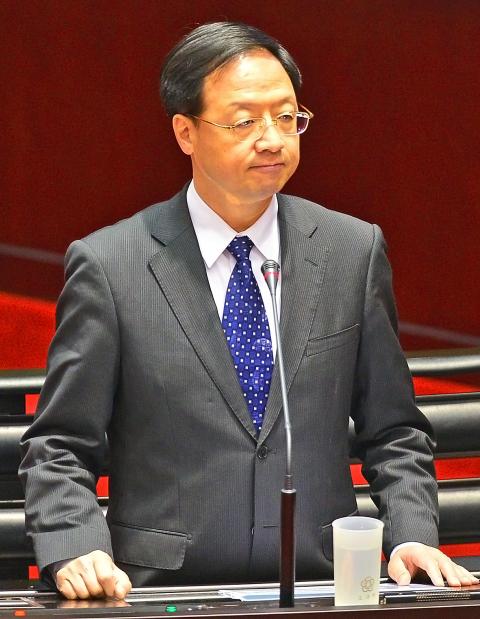Premier Jiang Yi-huah (江宜樺) recorded his worst approval rating since he assumed the premiership in February last year, with 66 percent of respondents disapproving of his performance, a survey released by Taiwan Indicator Survey Research (TISR) showed yesterday.
The survey was conducted amid the ongoing tainted cooking oil controversy, which has sparked widespread public outrage.
The 66 percent disapproval marked a 4.3 percentage point rise compared with last month’s results, while the proportion of those who said he is doing a good job decreased by 4 percentage points, to 15.6 percent.

Photo: Wang Yi-sung, Taipei Times
The poll also found dissatisfaction with President Ma Ying-jeou’s (馬英九) performance, at 73.6 percent, while only 14.4 percent said they were pleased. Additionally, 64.7 percent of respondents said they do not trust the president, while 19.3 percent of people said they do.
The results marked a 3.1 drop in approval for the president, while his detractors increased by 0.8 percentage points, compared with polls conducted in the latter half of last month.
On the economy, only 7.9 percent of respondents said the nation’s economy is strong, while a sweeping 83.5 percent majority said the economy is not doing well.
Compared with the polls conducted last month, the proportion of those who said that the economy is suffering fell by 3.4 percentage points, while the proportion saying otherwise rose 3 percentage points.
The poll showed that 47.3 percent said they could make ends meet, while 45.2 said they had trouble covering their expenses, compared with 47.5 percent “yes” against 43.4 percent “no” last month.
Meanwhile, the Chinese Nationalist Party’s (KMT) approval rating dropped by 5 percentage points compared with last month, while its disapproval rating rose by 2.8 percentage points.
In contrast, the Democratic Progressive Party’s (DPP) approval rating rose by 2.1 percentage points, while its disapproval rating fell by 4 percent, the poll showed.
In aggregate, the poll showed the gap in overall approval ratings between the KMT and the DPP has widened further, with that of the KMT decreasing by 2.3 percentage points to 36.3 percent, while that of the DPP hit 46.7 percent, a rise of 2.1 percentage points.
The poll collected 1,002 valid samples across the nation and has a margin of error of 3.1 percentage points.

Tropical Storm Gaemi strengthened into a typhoon at 2pm yesterday, and could make landfall in Yilan County tomorrow, the Central Weather Administration (CWA) said yesterday. The agency was scheduled to issue a sea warning at 11:30pm yesterday, and could issue a land warning later today. Gaemi was moving north-northwest at 4kph, carrying maximum sustained winds near its center of up to 118.8kph and gusts of 154.8kph. The circumference is forecast to reach eastern Taiwan tomorrow morning, with the center making landfall in Yilan County later that night before departing from the north coast, CWA weather forecaster Kuan Shin-ping (官欣平) said yesterday. Uncertainty remains and

SEA WARNING LIKELY: The storm, named Gaemi, could become a moderate typhoon on Wednesday or Thursday, with the Taipei City Government preparing for flooding A tropical depression east of the Philippines developed into a tropical storm named Gaemi at 2pm yesterday, and was moving toward eastern Taiwan, the Central Weather Administration (CWA) said. Gaemi could begin to affect Taiwan proper on Tuesday, lasting until Friday, and could develop into a moderate typhoon on Wednesday or Thursday, it said. A sea warning for Gaemi could be issued as early as Tuesday morning, it added. Gaemi, the third tropical storm in the Pacific Ocean this typhoon season, is projected to begin moving northwest today, and be closest to Taiwan on Wednesday or Thursday, the agency said. Today, there would likely

DISRUPTIONS: The high-speed rail is to operate as normal, while several airlines either canceled flights or announced early departures or late arrivals Schools and offices in 15 cities and counties are to be closed today due to Typhoon Gaemi, local governments announced last night. The 15 are: Taipei, New Taipei City, Taoyuan, Tainan, Keelung, Hsinchu and Kaohsiung, as well as Yilan, Hualien, Hsinchu, Miaoli, Chiayi, Pingtung, Penghu and Lienchiang counties. People should brace for torrential rainfall brought by the storm, with its center forecast to make landfall on the east coast between tonight and tomorrow morning, the Central Weather Administration (CWA) said. The agency issued a sea warning for the typhoon at 11:30pm on Monday, followed by a land warning at 11:30am yesterday. As of

CASUALTY: A 70-year-old woman was killed by a falling tree in Kaohsiung as the premier warned all government agencies to remain on high alert for the next 24 hours Schools and offices nationwide are to be closed for a second day today as Typhoon Gaemi crosses over the nation, bringing torrential rain and whipping winds. Gaemi was forecast to make landfall late last night. From Tuesday night, its outer band brought substantial rainfall and strong winds to the nation. As of 6:15pm last night, the typhoon’s center was 20km southeast of Hualien County, Central Weather Administration (CWA) data showed. It was moving at 19kph and had a radius of 250km. As of 3pm yesterday, one woman had died, while 58 people were injured, the Central Emergency Operation Center said. The 70-year-old